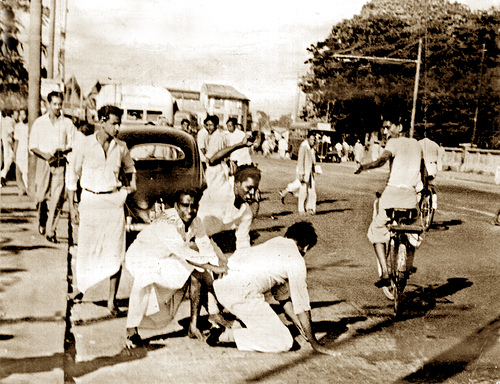Being A New Sri Lanka – Part 2
By Sanjayan Rajasingham -
Stay aware
I’ve often heard the refrain “I’m not interested in politics”. If “politics” here means the latest political gossip – what X’s son did, who Y snubbed, etc – I’m not too interested either! However, if it means how our rulers use the power we have given them, we need to think again. Their power is public power, and they hold it for us. If we don’t keep an eye on them, they will probably abuse it.
Start small on this one. If you aren’t a newspaper person, read an article on the front page of a newspaper each day, or if that’s too much, one on the front page of a Sunday paper. Another option is to follow a certain column (though here you are at the mercy of what the columnist thinks is important). Either way, try and do one thing a week to keep in touch with what’s going on. Along with this, talk to others about what you read. Even if the papers are anathema to them, they will listen (at least briefly) because it’s coming from you.
There are several important things going on these days. Check out 100days.lk and see if promises are being kept. Find out about the budget, and ask if it’s just another election gimmick. Check out the reinstatement of Shirani Bandaranayake and ask if you think it was right. These are the “political” events that we need to know something about.
Protest!
Go for public protests and rallies. This will require time, some inconvenience, and a willingness to accept a minimal level of risk. It is because of this that they are important. Quite apart from whether the protest succeeds or not, there is something about engaging in public protest, about publicly demanding change, that can be transformative. It builds confidence. It makes us more likely to resist when we are wronged. It deals a blow to the play-it-safe mentality which is lethal to a democratic ethos. In short, it builds civic character.
However, don’t just protest for “your” causes. Go for protests on issues that don’t affect you. Join the a May Day Rally. If you are a minority, protest about a majority issue and vice versa. We need to stand in solidarity with others, and this is one way that all of us can do so.
Find out about the past
Shortly after finishing my ‘O’ Level exams in 2006, I realized how little I was taught about post-independence Sri Lanka. My textbooks had nothing to say about Rohana Wijeweera and the two JVP insurrections, let alone why they came about. They had nothing about SJV Chelvanayakam, of the ethnic riots of ’58, ’77, ’81 and ’83, or of the Banda-Chelva and Dudley-Chelva pacts. Whatever the reason these (and other) events were excluded, it meant that many of my generation knew nothing about them. Or, they only knew those parts that were passed on within their communities.
Why do we need to know about the past? We do because each community in Sri Lanka sees itself and others in the light of these events. Past injustice, violence and betrayal all colour how people act today. If we genuinely want to understand the other, we need to know where they are coming from. And if we want to move on form the past, then we need to know what it is we are moving on from.
This is not a call for degree-level knowledge of our history. It is a call for a basic understanding about critical moments in the past. Reading up is one option, and let me suggest the interview section of the online book The Republic at 40 as a good place to start.[i] If reading isn’t an option (!) then speak to people who know, or go for public talks and discussions. Decide today to find out what incidents those in communities outside your own consider important, post-independence. Then, commit to find out more about it.
Say no to corruption and influence
I chose these two because they are widespread problems. We need to be willing to say no, to refuse to be party to corruption and the wrongful use of influence. This will be tough. This is where we decide how much we actually want a new Sri Lanka. Every time we bribe or wrongfully influence our way to what we want, we contribute to a culture where these things are normal. We make them seem OK, and we make it seem inevitable.
Quite apart from individual action, think about the implications of collective action in this area. What if entire groups of people decided to refuse to pay bribes to driving schools for their driving licenses? If all these people were failed en masse for doing so, what if they decided to file action, instead of deciding of giving in?
Dream
What sort of place do we want Sri Lanka to be in 20 years? We all know the vague answer to this question – “all communities living in peace and harmony” etc, etc. But what do we want specifically? What is our vision for Sri Lanka? If we decide to be realists, stuck forever with a vision for Sri Lanka that is limited by present possibilities, we will settle for the mediocre. Realism is useful, but we also need idealism. We need a big, bold, imaginative vision for what sort of society we want. Only then will we have the direction and energy we need for change.
For example, what do we want the Sri Lankan identity to signify? What common factors should bind us together, while also allowing us the space to be different as communities? I remember someone suggesting our quirky inventiveness – seen in the creation of the doosra and the dilscoop in cricket – as perhaps one aspect of that identity. What else should we add?
Or we can ask what we want our public transport system to be like. Of course it shouldn’t be one where our morning commute leaves us exhausted. But what should it be like, in a positive sense?
Or we can ask what can we do about the fact that proceedings in our superior courts are conducted in English, a language alien to many of those who need justice the most? Is there a way to make them more inclusive, while ensuring that everyone concerned knows what’s going on?
Conclusion
It is only when we become different citizens that we will see a different Sri Lanka. The suggestions above are, hopefully, a step in that direction. If they are too daunting, then start with something even smaller: be friends with people who are different. In a society where dissent and diversity are seen as negatives, that’s good enough! Also, if possible, rope in others who are interested, to join. Discussing, protesting, dreaming – all of this is made more powerful when it is done by a group rather than by individuals.
Making a new Sri Lanka will not be easy, and it won’t be quick. But it is possible. We just need to ensure that our inability to do everything does not stop us from doing something. Rather we must act as we can and then, one day, we will make a difference.
*This is a continuation of a previous article ‘Being a New Sri Lanka’ < https://www.colombotelegraph.com/index.php/being-a-new-sri-lanka/ >
[i] Asanga Welika (ed), Center for Policy Alternatives and Freidrich Naumann Foundation for Freedom < http://republicat40.org/pdf/ >





